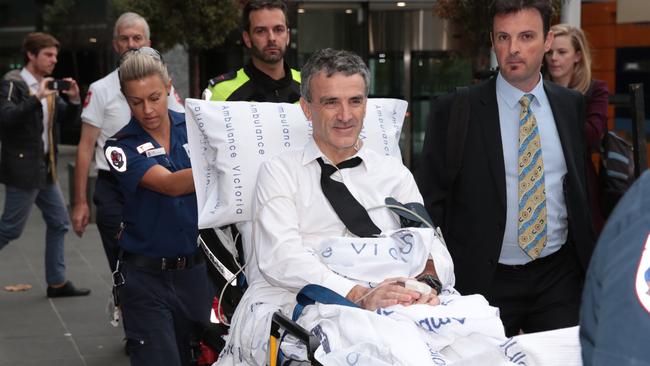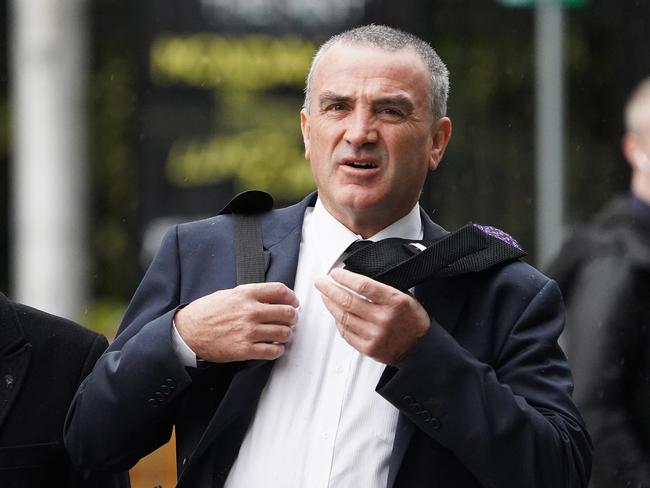Heavy fines ordered for Dover Financial, Terry McMaster
Dover Financial and its principal Terry McMaster, who collapsed in the Hayne royal commission, have been fined for misleading clients.

The financial adviser who shot to fame after fainting during gruelling cross-examination at the 2018 Hayne royal commission has been personally hit with a $240,000 fine and his now defunct firm penalised $1.2m for publishing misleading and deceptive statements in a so-called “client protection policy”.
Federal Court judge Michael O’Bryan excoriated Dover Financial principal Terry McMaster for having only a “limited appreciation of the seriousness of the contravening conduct and little if any contrition for the wrongdoing”.
While accepting Mr McMaster’s evidence that he became suicidal after his appearance in the royal commission, and that he had also suffered post-traumatic stress and depression, Justice O’Bryan said this mostly flowed from the royal commission appearance rather than ASIC’s subsequent enforcement action.
“Given the importance of the principle of general deterrence, and the limited extent to which this proceeding has caused adverse reputational and health effects to Mr McMaster, I give this factor limited weight,” he said.
The judge also took a dim view of the Dover chief’s sworn statement of his financial position, in which he listed his current assets as a $700,000 unit in the bayside Melbourne suburb of Hampton, and minor, low-value personal effects.
Cross-examination, however, had revealed that this evidence was “partial and misleading”, and that he relied on income generated by family trusts which he did not control.
ASIC commissioner Danielle Press said the purpose of Dover’s client protection policy was to exclude or limit the firm’s liability to clients to its own financial benefit.
“The significant penalties handed down demonstrate the seriousness of this misconduct and will act as a deterrent to others who believe they can get away with similar behaviour,” Ms Press said.
The court determined in November 2019 that Dover provided its client protection policy to 19,402 clients between September 2015 and March 2018, and that the title was “highly misleading and an exercise in Orwellian doublespeak”.
“The document did not protect clients,” Justice O’Bryan said at the time.
“To the contrary, it purported to strip clients of the rights and consumer protections they enjoyed under the law.”
Mr McMaster was found to be “knowingly concerned” in that conduct and in breach of the ASIC Act.
In the penalty hearing, ASIC argued for an overall penalty in the range of $9.3m to $12.1m for Dover and $2.9m to $3.5m for Mr McMaster.
However, Justice O’Bryan found that the contravening acts were a single course of conduct rather than multiple transgressions.
While the evidence showed it was unlikely that clients had suffered loss before ASIC’s intervention, the judge said the policy could have caused consumers “very great loss” because it had the potential to mislead them into believing they had no legal recourse against Dover.
“The seriousness of the contravention must also be assessed by the loss that the conduct had the potential to occasion,” he said.
Dover ceased to operate after its financial services license was cancelled in July 2018.
Mr McMaster told the court that, since then, his main activities had been winding up the business and collecting debts.
Between June 2018 and March 2020, Dover’s net assets had collapsed from more than $3m to $20,000, although part of the decline was due to payment of a $1.23m dividend to pay a bank debt.

Justice O’Bryan said Mr McMaster was not consciously aware that the client protection policy contained a false or misleading statement - a fact caused by “excessive confidence in his own legal qualifications and being unreceptive to concerns being raised about the policy.
He had also maintained that ASIC was partly to blame for Dover’s contraventions, because the firm would have stopped its misleading conduct immediately if it had been informed by the regulator in a “timely manner”.
It was therefore clear that Mr McMaster’s statements were not the result of impulsive behaviour brought about by the stress and depression he suffered after the royal commission.
“Mr McMaster continues to hold the views expressed above,” Justice O’Bryan said.
“Given the lack of documentary support for those views, I find that the views have arisen from Mr McMaster’s unwillingness to accept responsibility for the wrongdoing the subject of this proceeding and desire to blame others, particularly ASIC, for the events that occurred.
Dover’s problematic protection policy was provided to clients along with statements of advice by advisers.
While the policy purported to ensure that every Dover client got the “best possible advice and the maximum protection available under the law”, the court found in 2019 it was false, misleading or deceptive.
Among other things, it tried to remove or dilute protections otherwise available under the law, and sought to prevent clients from making claims against Dover and its authorised representatives on the basis that the advice could not be understood.
It also aimed to exclude Dover’s liability for most foreseeable breaches of the law by its authorised representatives, and limit Dover’s liability to clients in a way that was inconsistent with the law.
As Dover’s sole director and key person named on its financial services license, Mr McMaster was ruled to be knowingly concerned in Dover’s contraventions.
Justice O’Bryan ordered Mr McMaster and Dover to pay ASIC’s costs.




To join the conversation, please log in. Don't have an account? Register
Join the conversation, you are commenting as Logout